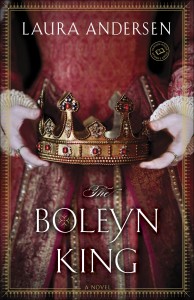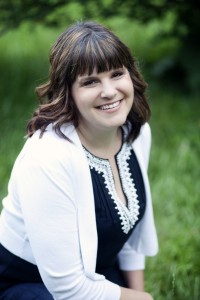Laura Andersen on the Tudors and Alternative History
Mark Evans
Anne Boleyn gives birth to a healthy son who lives to succeed Henry VIII as King of England. This is the fascinating premise on which debut author Laura Andersen’s novel, The Boleyn King (Ballantine, May), is based. Mark Evans speaks with Laura Andersen.
ME: How would you describe your novel? Is it a book for fans of historical novelists like Philippa Gregory, or fans of alternative history writers like Harry Turtledove? Who will it most appeal to?
LA: The most accurate term is alternative history, but it appears to appeal more to readers who like straightforward historical fiction. Certainly I think fans of the Tudor era, once they get over the central conceit that Anne Boleyn’s son lived to become king, might enjoy meeting familiar historical figures in slightly altered circumstances. It’s a less a novel about the wide-ranging effects of a single historical change and more about how those changes play out in a small circle of family and friends.
ME: What motivated you to write the book? Were you more interested in the actual history or in considering ‘what-if’?
LA: The idea upon which the entire story turns is that Anne Boleyn did not miscarry her son in January 1536 but that he grew up to succeed Henry VIII as king, so clearly “what-if” is central. However, I truly enjoyed taking the history and coming at it sideways, if you will. Some events would still have happened, some would not, and some might be recognizable though spurred by slightly different motives. After all, whoever is ruling, Northumberland is still ambitious and George Boleyn is still clever and proud and Mary Tudor is certain of the righteousness of her position.
ME: It’s been said that your interest in the Tudors was sparked by a visit to Hampton Court outside London. What else motivated you to set the story of The Boleyn King in the Tudor period and around the royal court?
LA: As the central conceit of the original idea was the survival of Anne Boleyn’s son, it would have been difficult to set it in any period other than the Tudors. But I do enjoy royal courts because they provide such scope for intrigue and secrets and life or death choices. Also, I’m quite fond of swords and horses and gorgeous dresses and since my own life is mostly spent in jeans or yoga clothes I’m quite happy to spend hours each day in a far different milieu.
ME: The Boleyn King is a tale woven around a number of historical characters: Princesses Elizabeth and Mary, and Robert Dudley; and fictional King Henry IX, Dominic and Minuette. What influenced your choice of characters and the balance you struck between fictional and historical personalities?
LA: Obviously Anne and Henry’s son would be fictional, but beyond William I think Dominic and Minuette gave me a way to understand the royal characters that I wouldn’t otherwise. I think of it a bit like getting to see royalty both on and off stage. Dominic and Minuette give William and Elizabeth a safe space in which to be all of themselves and not just the titles they’ve been bred to carry. For the bulk of the novel, I use four viewpoints and three of them are fictional, with Elizabeth Tudor the exception. And by far, Elizabeth’s point of view was the most difficult for me to write. I find that my respect for real people (even the dead) can get in my way when needing to write them into fiction.
 ME: The story of Anne Boleyn is given less weight in your novel than that of her fictional son and his peer generation. Why is this?
ME: The story of Anne Boleyn is given less weight in your novel than that of her fictional son and his peer generation. Why is this?
LA: Anne Boleyn is such a central figure to Tudor history that I actually quailed a bit at the thought of doing her justice. It seemed much too impertinent to walk into her mind wholesale as I would have needed to do if she had been the main character. And also, the original idea for the story, the emotional moment that threw its weight on me going forward, was not only the “what-if” of Anne’s son, but how that son might one day re-enact to some degree his father’s romantic and political obsessions.
ME: You have a BA in English and describe yourself as reading everything you can get your hands on. How Catholic is your taste in reading? (No pun intended). How much of your reading directly influenced The Boleyn King? Which writer, if any, most influenced you in choosing to write in the first place, and which influenced you most in the writing of The Boleyn King in particular?
LA: Very Catholic! Mysteries have been my first and enduring love, and I am inspired by the psychological depths of writers like P.D. James and, more recently, Tana French. The historical fiction writers who most inspire me are Dorothy Dunnett, whose Lymond Chronicles I read over and over again and Sharon Kay Penman. If I could ever learn to write with their knowledge and intellectual depth, not to mention the deep instinct for character, I might die happy.
ME: Can you see yourself writing in other genres in the future? Do you have a subject in mind?
My first love is mystery novels. I’m not sure I’ll ever have the necessary plotting skills to pull off a strong mystery series, but if I could manage to find the right characters and setting as a backbone, I would love to tackle it. I have a great love for many historical mystery series and their detectives, such as Ellis Peters’ Brother Cadfael, Ariana Franklin’s Adelia Aguilar, and Laurie R. King’s Mary Russell. My newest love is Maggie Hope, whose first outing is in Susan Elia MacNeal’s Mr. Churchill’s Secretary.







